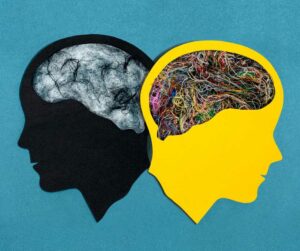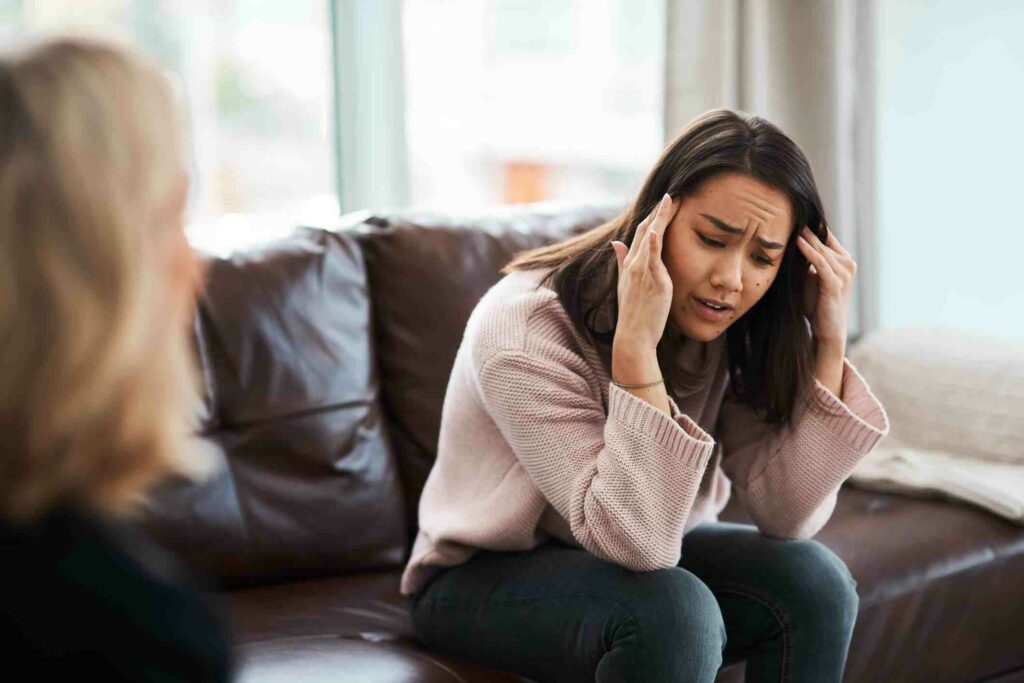Bipolar depression can be a very serious mental illness. It is characterized by extreme mood swings, from manic highs to depressive lows. If you are experiencing these symptoms, it is important to get help right away. In this blog post, we will discuss the signs and symptoms of bipolar depression, as well as how to treat it.
Contents
What Is Bipolar Depression?
 Bipolar depression is a type of depression that occurs in people who have bipolar disorder. People with bipolar disorder experience periods of mania or hypomania, followed by periods of depression. During a depressive episode, a person may feel sad, and hopeless, and lose interest in activities they normally enjoy.
Bipolar depression is a type of depression that occurs in people who have bipolar disorder. People with bipolar disorder experience periods of mania or hypomania, followed by periods of depression. During a depressive episode, a person may feel sad, and hopeless, and lose interest in activities they normally enjoy.
Bipolar depression can be difficult to diagnose because it shares symptoms with other types of depression, such as major depressive disorder. It is believed that this condition is underdiagnosed and that many people who have bipolar disorder are misdiagnosed with major depressive disorder.
According to studies, the prevalence of bipolar depression is estimated to be between 15-30%. This means that if you have 100 people with bipolar disorder, 15-30 of them will experience depressive episodes. However, there is a wide range in the severity of symptoms, and not everyone will experience the same symptoms.
Therefore, it can be a difficult condition to deal with, you must be sure to see a mental health professional so they can give you an accurate diagnosis. And then they can help you develop a treatment plan.
Is Bipolar the Same As Depression?
Many people believe that bipolar disorder is the same as depression. However, there are some key differences between the two conditions.
For example, people with bipolar disorder experience extreme mood swings. These can range from periods of mania or hypomania (abnormally high energy levels and decreased need for sleep) to periods of deep depression. People with bipolar disorder may also have delusions or hallucinations.
In contrast, people with depression generally do not experience such extreme mood swings. They may have low energy levels and sleep a lot but they are still able to function normally. People with depression also typically do not have hallucinations.
So how can you tell if someone has bipolar disorder or depression? If you are unsure, it is always best to consult with a mental health professional. They will be able to give you a proper diagnosis and recommend the best course of treatment.
In some cases, both conditions can merge and it can be difficult to differentiate between the two. This is why it’s important to seek professional help if you think you or someone you know may be suffering from either disorder.
How To Recognize It?
 There are several types of symptoms to recognize bipolar depression. The most common are:
There are several types of symptoms to recognize bipolar depression. The most common are:
- feeling very sad or hopeless
- loss of interest or pleasure in activities you used to enjoy
- changes in appetite or weight
- sleep problems, such as insomnia or sleeping too much
- fatigue or low energy
- problems concentrating, remembering, or making decisions
- feelings of worthlessness or guilt
- recurrent thoughts of death or suicide
The symptoms are usually considered to be major depressive episodes. To be diagnosed with bipolar disorder, you must have had at least one manic or hypomanic episode in your lifetime.
More often, the signs to recognize also vary depending on the person’s age. In young people, for example, symptoms may be more irritable than depression. And in older adults, depression may be less noticeable because it manifests more as physical complaints than mood changes.
If you think you might be experiencing bipolar depression, it’s important to seek professional help. A mental health professional can give you a complete evaluation and talk to you about your treatment plan.
What Causes Bipolar Depression?
 The causes generally fall into two categories: chemical imbalance and life stressors.
The causes generally fall into two categories: chemical imbalance and life stressors.
This is one of the most common causes of bipolar depression. It is a result of an imbalance of neurotransmitters in the brain. These are the chemicals that transmit messages between nerve cells, and they play a role in regulating mood. For example, serotonin is a neurotransmitter that helps to regulate mood, sleep, and appetite. The imbalance of neurotransmitters in the brain, while the latter can trigger a manic or depressive episode.
Another common cause of bipolar depression is life stressors. These can be anything from relationship problems to financial difficulties. Stressful events can trigger depressive episodes in people with bipolar disorder. Some common life stressors could be:
- Losing a job
- Going through a divorce
- The death of a loved one
- A chronic illness diagnosis
So these two are the most common causes of bipolar depression, chemical imbalance, and life stressors. But there are other possible causes as well. Other possible causes include:
- Genetic disposition
- Changes in sleep patterns
- Abuse of drugs or alcohol
- Hormonal changes
- Side effects from medication
So it is important to be aware of the possible causes and risk factors so that you can reduce your chances of developing bipolar depression.
What Are Some Complications?
If bipolar depression is left untreated, it can lead to a number of problems. These include:
Substance abuse
It is one of the common consequences that people with bipolar depression turn to drugs or alcohol as a way of self-medicating. This can lead to addiction and further complicate the condition. And people choose this because they feel like they can’t do anything else to make themselves feel better.
Loss of productivity
 Even simple fatigue or tiredness makes it difficult to function at work or school. This can lead to a lot of missed days, tardiness, or poor performance. Then, think bipolar depression can interfere with concentration, motivation, and the ability to think clearly. This can make it very difficult to get anything done. These difficulties can lead to problems in all areas of life, including work, school, and personal relationships.
Even simple fatigue or tiredness makes it difficult to function at work or school. This can lead to a lot of missed days, tardiness, or poor performance. Then, think bipolar depression can interfere with concentration, motivation, and the ability to think clearly. This can make it very difficult to get anything done. These difficulties can lead to problems in all areas of life, including work, school, and personal relationships.
Relationship difficulties
It is not uncommon for people with bipolar disorder to have difficulties in their relationships. This can be due to the fact that they may feel more irritable or even paranoid when they are experiencing a depressive episode. If you notice your loved one is having difficulty in their relationships, it may be a sign that they are dealing with bipolar depression.
Low self-esteem
Self-esteem is an important part of bipolar depression. People with bipolar depression may feel like they are not good enough or that they do not deserve to be happy. They may also feel like they are a burden to others.
Self-harm or suicide
This might seem like an extreme symptom, but it’s important to remember that bipolar depression can be incredibly debilitating. If you or someone you know is exhibiting signs of self-harm or suicidal thoughts, it’s important to seek help immediately. For example, some people with bipolar depression may exhibit the following behaviors:
- talking about harming or killing oneself
- expressing a desire to die
- making a plan or finding the means to commit suicide
- talking about being a burden to others
- feeling hopeless or trapped
If you notice any of these behaviors in yourself or someone else, it’s important to seek professional help. You should understand that bipolar depression is a real and serious condition that requires treatment. If you or someone you know is struggling with bipolar depression, there are resources available to help.
How To Diagnose It?
 The diagnosis of bipolar depression is difficult and can be tricky. There are many different types of bipolar disorder, and each type has its own set of symptoms. To be diagnosed with bipolar disorder, a person must have had at least one manic or hypomanic episode in their lifetime.
The diagnosis of bipolar depression is difficult and can be tricky. There are many different types of bipolar disorder, and each type has its own set of symptoms. To be diagnosed with bipolar disorder, a person must have had at least one manic or hypomanic episode in their lifetime.
According to DSM-5, the diagnosis of bipolar depression includes methods of excluding other potential causes of the symptoms. These other potential causes could be another mental disorder, physical illness, medications, or substance of abuse. A full psychiatric evaluation will be conducted to determine if bipolar disorder is the correct diagnosis.
The evaluation will include a medical history, family history, and psychological assessment. The goal of the evaluation is to determine if the person has had any previous episodes of mania or hypomania. If the person has not had any previous episodes of mania or hypomania, they may be diagnosed with major depressive disorder instead of bipolar disorder.
After a psychological evaluation, there could be test done to rule out other potential causes of the symptoms. These tests could include:
- a physical exam
- lab tests
- imaging studies
There is no definitive test for diagnosing bipolar depression. But an accurate depression can make all the difference in developing a treatment plan that will work for you.
Can Bipolar Depression Be Treated?
 There are numerous ways that bipolar depression can be treated. Some people may require medication, while others may only need therapy. It is important to speak with a mental health professional to determine what type of treatment is right for you.
There are numerous ways that bipolar depression can be treated. Some people may require medication, while others may only need therapy. It is important to speak with a mental health professional to determine what type of treatment is right for you.
Therapy
Therapy is the vital first step in treating bipolar depression. It can help you understand your condition and learn how to manage your symptoms. Therapy can also provide support and guidance during difficult times. The aim of the therapist is to help you develop healthy coping mechanisms. Some common therapy types include:
- Cognitive behavioral therapy: This type of therapy helps you identify negative thoughts and behaviors and replace them with positive ones.
- Interpersonal therapy: This type of therapy focuses on your relationships and how they contribute to your mental health.
- Family-focused therapy: This type of therapy helps improve communication and problem-solving within the family.
Medication
Medication can be an effective treatment for bipolar depression. Antidepressants are often prescribed to help stabilize moods. Mood stabilizers and antipsychotics may also be prescribed. It is important to work with a mental health professional to find the right medication for you.
Because medication can have side effects, it is important to work with a mental health professional to find the right medication for you. If you are taking medication for bipolar depression, it is important to take it as prescribed and not skip doses.
Support groups
 It is important to realize that you are not alone when dealing with bipolar depression. There are many others who have gone through, or are currently going through, the same thing. Also, there are support groups available to help you cope. There are a few different types of support groups.
It is important to realize that you are not alone when dealing with bipolar depression. There are many others who have gone through, or are currently going through, the same thing. Also, there are support groups available to help you cope. There are a few different types of support groups.
One type is a peer-to-peer group, where members share their experiences with each other in order to offer support and understanding. These groups can be very helpful, as they provide a sense of community. Another type of support group is led by a mental health professional. These groups usually focus on education and skills building, in addition to providing support.
Self-help
This is always an essential first step and there are many things you can do to help yourself. These include:
- Identify your triggers: What sets off your low moods? Is it a particular time of year, stress at work, or something else? Once you know what triggers your bipolar depression, you can develop a plan to avoid or deal with them.
- Stick to a routine: Having a set schedule can help stabilize your moods. Get enough sleep, eat healthy meals, and exercise regularly.
- Connect with others: Isolation can make bipolar depression worse. Spend time with family and friends, join a support group, or see a therapist.
- Take care of yourself: This means more than just eating right and exercising. Be sure to do things you enjoy and make time for relaxation. Pamper yourself with a massage, take up a new hobby, or just read your favorite book.
These are some common self-help things that you can do to help manage bipolar depression. If you find that your symptoms are getting worse or impacting your life in a negative way, it’s important to seek professional help. A therapist can provide support and guidance as you develop a treatment plan. Medication may also be necessary to stabilize your moods.
Overall you should not try to go through this alone. Bipolar depression is a serious condition that requires treatment. But with the help of a professional and some self-care, you can manage your symptoms and live a full life. So do not wait longer because the sooner you seek help, the better.
Conclusion
In the conclusion, it is important to remember that bipolar disorder is a serious mental illness that should not be taken lightly. Because it can be difficult to recognize and treat, that is why professional help is needed in order to fully recover. With the proper treatment, people with bipolar disorder can lead happy and fulfilling lives.
If you or someone you know is displaying symptoms of bipolar depression, then try not to ignore them. The sooner you get help, the better the chances are for a successful recovery. There are many resources available to help you learn more about this disorder and how to treat it, so please do not hesitate to seek out assistance.
In any case, you want to be sure that you are getting the most accurate information possible about bipolar depression and its treatment, so please consult with Therapy Mantra. Here the team of experts will guide you about this condition and support you in your recovery process. Contact us today to learn more about our services. And, also book an online therapy session or download our free Android or iOS app.


